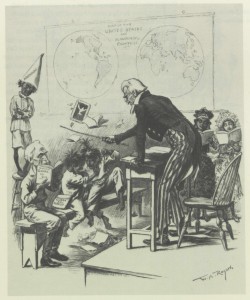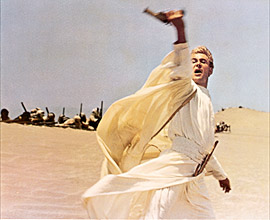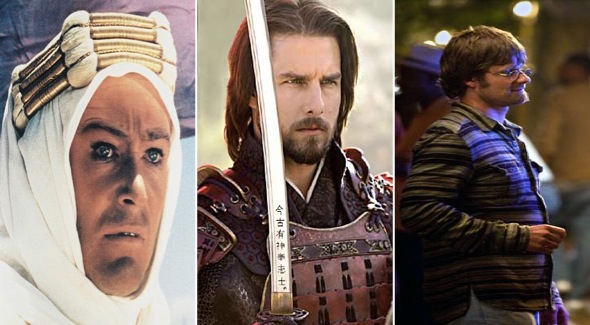
Somewhere, in the world, a primitive people are in peril.
Maybe they’re tearing their country apart with civil war. Maybe ruthless companies have invaded their lands to exploit their natural resources. Or maybe they’re dying out because they’ve lost respect for their ancient traditions. Whatever the case, the world is in danger of losing their wisdom, forged in a hostile land (I mentioned it was a hostile land, right? sorry; goes without saying).
Fortunately, in times like these there comes a man. A White Man.
We may decry the imperialist sentiment of work like Kipling’s “White Man’s Burden,” but we should never forget that it came from good intentions. Kipling, Victoria and the rest of the Empire thought that they were helping the subcontinent out by giving them railroads, telegraphs and the opportunity to work for shillings. Of course, if the British isles happened to get rich off of tea, ink and spices in the process, so much the better! But the great empires of Europe didn’t rewrite the African and Asian continents out of malice. They thought they were helping the poor darker races. Or at least that’s what they told themselves.
Take up the White Man’s burden–
Send forth the best ye breed–
Go bind your sons to exile
To serve your captives’ need;
To wait in heavy harness,
On fluttered folk and wild–
Your new-caught, sullen peoples,
Half-devil and half-child.[…]
Take up the White Man’s burden–
The savage wars of peace–
Fill full the mouth of Famine
And bid the sickness cease;
And when your goal is nearest
The end for others sought,
Watch sloth and heathen Folly
Bring all your hopes to nought.

PICTURED: Uncle Sam, as a schoolmaster, disciplines Cuban patriots and guerillas. Obedient students Hawaii and Puerto Rico read in the corner.
As the metaphysical scope changed from the imperial (19th century) to the personal (20th), so too did the journey depicted by art. White people no longer thought they could gallivant across the world and scoop up riches by the handful. But white men, individually, thought they might travel around the world and scoop up wisdom.
Some of the most popular movies of the 20th century depict that journey. They range from epic classics (Lawrence of Arabia, Seven Years in Tibet) to derivative fables (Avatar, The Last Samurai, Red Corner). But no matter the quality, the kernel of the story’s the same. It’s the 20th century’s contribution to the catalog of monomyths:
- White man suffers loss, tangible or psychological, in his native land.
- White man travels to exotic country.
- White man suffers at the hands of natives, who mistrust him and the colonizers he came with. White man is broken down.
- White man is made new in the tradition of the natives.
- White man aids the natives in resolving some conflict – sometimes with other natives, sometimes with the original colonizers.
- White man retires to native territory to live in peace, or else returns to home country bearing native wisdom.

Not just any white man, but the whitest possible man.
The late 20th century has liberalized the White Man’s Monomyth in allowing women to undergo similar revelations (Beyond Rangoon, Medicine Man, etc). But the arc is always the same. The natives need help defending themselves against some threat. Only a white man can save them. But the only reason a white man would have to fight alongside the natives is if he falls in love with the natives first.
Why is the white man necessary? Sometimes he has access to superior technology: firearms, radios, jet airplanes. Sometimes he has superior knowledge, like tactics or history or even just the ability to second-guess the white oppressors. And sometimes his only advantage is the perspective of the outsider: the alien who can comment on the quirks of ingrained culture. Regardless, that one aspect of the White Man’s Monomyth never changes. It takes a White Man to save a village.
And then along came David Simon.

Well…. I am not an American, but I think I can present a crucial factor here:
We compare movies with television. Movies are for international audiences who are going to say: oh! Brad Pitt. I like this White Man. I’m watching it (or at least this is what the production company thinks). This is why the whole Last Airbender controversy is all about: making the protagonist white just for the sake of it (even though I have to watch the movie to form my personal opinion). The Wire is a series never shown in my country. Why? Probably because such a show is not bankable here. Does that hurt the interests of the show’s producers? I doubt it. My country was never included in their target group. Also, let’s not forget the difference between the woman in Disney movies and in Disney series (Ariel vs. Kim Possible anybody?).
So, this is my opinion. I hate the White Superhero, however delicately his super powers are presented. And this is why I like world cinema: the directors are not afraid to use a language that’s not English and the scripts reflect the actual culture of the country, without the “discreet” eye of the White Man (or Woman).
I’ve always seen Simon’s white asshole characters as author avatars, ’cause Simon is well known to be, and comes off across in interviews, as a asshole–although clearly a charming one. In McAlary this author identification is doubly clear, since his entire character is based on idea of striking a balance between “authenticity” and “selling out” (clearly a balance any TV writer has to strike). Plus McAlary, like Simon, lives and breathes black culture even though he’s white. Which is all really interesting when you consider the authenticity debate within the show, particularly the meta bit at the end of the last episode when a group of black New Orleans natives stare down a busload of white tourists and their driver.
Meant to write “an asshole,” obviously. Apologies.
@mlawski: that vignette (and others like it) will be part of my next “Overthinking Treme” post.
@Maria: that’s an intriguing observation! One thing I’ll note is that, despite its overwhelming critical acclaim, The Wire struggled to find an audience in the U.S. – for a lot of the same reasons you mention. American television audiences are used to urban blacks sounding a particular way (typically higher vocal register, louder in volume, and a more “TV-friendly” Southern accent). The Wire cast black actors who talk the way Baltimore natives genuinely talk.
Perich – love the article. I was lazily reading the first page then BAM, suprise Wire article!!! When is the Podcast going to finally Overthing the Wire?
@Bob: honestly, I think the Wire’s been pretty well Overthought by better pundits than we. Our motto is “subjecting pop culture to a level of scrutiny it probably doesn’t deserve,” and The Wire deserves all the scrutiny it gets. Hell, I was hesitant to go in on Treme for the same reason, but it’s fresh and I found an angle.
If Davis McAlary is an avatar for David Simon then what are we to make of the existence of Davis Rogan, an actual New Orleans ex-DJ at WWOZ and musician whose song “Strippers” is on his 2005 album “The Once And Future DJ”
Evaluating any creative art through what we believe we know of its creator — through our assessment of interviews or profiles or whatever — is a dubious process. Ad hominem can inhibit an understanding of the actual work, not enhance it.
McNulty might have some Simon in him. Might also be Ed Burns. Or half a dozen other writers who worked on the show. Or half a dozen other Baltimore cops known to Simon or the other writers.
I honestly like this site for what it is, but you folks come off as a low rent version of The A.V. Club. Maybe you should give Nathan Rabin a resume and see what happens.
Hah! We should slap that on a t-shirt.
@Bill – There are worse things to be compared to – I’m a tremendous fan of all the manifestations of The Onion. And of course, the A.V. Club folks get paid, and we are all doing this on the side, for the lulz. If we could all somehow work on Overthinking It fulltime (or even more part-time)… wow. We’d kick SO much ass. This may sound kind of conceited, but the people who write for this site are some of the funniest and most talented people I’ve ever met.
Plus, we attract a higher class of commenter (I’m being serious).
I think it’s worth pointing out that since Lawrence is among other things gay masochist, the initial image of Pure White Hero he presents is complicated by his actual character as it develops, and by the end the viewer seems him through the eyes of the Arabs, rather than the other way around.
(Not that the ‘gay’ part is pejorative, just that Lawrence is a complicated, tortured, and unusual man and not a Sam Worthington-style blank slate)
@Tom S: I’ll agree that T.E. Lawrence is a more complex character than most (the moreso for being a real human being). But it’s still his exposure to Araby that changes him. That’s an essential part of the White Man’s Burden monomyth: the white man, missing something, finds it in a foreign land. To say nothing of casting Alec Guinness or Anthony Quinn as Arabs.
(This takes nothing away from the monumental quality of Lawrence of Arabia as a film. But I’m comfortable simultaneously admitting that I really like a movie and that its racial identities sit funny with me)
@Matthew Belinkie
I think Bill was trying to say you guys are A.V. Club Material and it wouldn’t hurt to try to write for them. I know I’d love a job in a NYC high rise writing about the virtues of the Durain fruit or 21 spin-offs that never made it.
While that’s true of the White Man’s Burden Monomyth, I think it’s more broadly true of any “A stranger rolls into town, and…” story; look at anything from Beowulf to Yojimbo to The Wizard of Oz (although that one is pretty colonialist in a Narnia sort of way.) I think one of the reasons the Wire and Treme are different from a lot of those stories is because they are a different genre; they’re like Do The Right Thing, stories about a community and how it deals with things (or fails to deal with them) and not about a single heroic figure.
I think a movie that gets at the heart of that split is The Third Man- it looks like a heroic fiction story, where Cotten’s character is going to get to the bottom of things, dammit, but the community is bigger than he is, and Cotten is mostly just blundering around and screwing things up. Vienna deals with its own problems, and sends Cotten home to continue writing his cowboy novels where strangers do solve things heroically.
I’m not going to deny the whatever-the-Arab-equivalent-of-blackface is, though- I think there was an idea of using Guiness as Faisal to highlight his European-ness and his distance from his people, but that’s a weak justification and doesn’t apply to Quinn in any case. I would argue that the politics of hiring one ethnicity to play another are fairly complicated and not necessarily inherently hateful outside of literal blackface, though.
@Tom S:
This example might not be particularly bad, but what about casting very obviously ethnically Indian Naveen Andrews as an iraqi in Lost? The ‘they’re all brown, it’s basically the same’ attitude is pretty damn toxic.
especially when the story wouldn’t change significantly if he were a Taliban-sympathizing ISI agent.
It’s a difficult issue, since on the one hand I think people should be free to cast whomever the feel best fits the role, and on the other hand that process seems coincidentally to benefit white people and name actors disproportionately.
If nothing else, it lessens people’s belief that they can place someone’s ethnicity by how they look, which I would argue is not a bad thing.
In any case, I think it’s only really hateful when the portrayal is a burlesque of the ethnic group portrayed- Mickey Rooney in Breakfast at Tiffany’s, for example- and otherwise just an example of how a system that tends to prefer the white, pretty, and recognizable propagates that tendency.
Great article!
But what about the gender issue that is so apparent here?!? True, all the white major characters in Treme are somewhat assholes, but what about the women? Specifically, Janette (the chef), Toni (the lawyer) and Annie (the violinist) are all partners / girl friends of those white male assholes, but they themselves are presented as nice people. So what’s the deal with this? Provocative question: Are white women not worth carrying the white asshole’s burden in David Simon’s world?
“# Pisses off his radio station bosses by refusing to play songs off a corporate playlist;
# Hangs around Elvis Costello (himself) in a creepy and awkward way after spotting him at a bar; ”
Huh? the first thing is heroic and the second thing is understandable – it’s Elvis Costello! and he even wrote ‘Radio Radio’ about, um, fighting corporate radio
The author does not know Kipling. White Man’s Burden is a critique of that very “imperialist sentiment” the author seems to think it glorifies.
Kipling is far more sensitive, nuanced and subtle than he is given credit for. It’s a shame, because he’s a heck of a story teller, and those who avoid reading him thinking him an obtuse tool of Empire lose out.
@Brimstone: “heroic” is, I think, big talk for avoiding a corporate playlist. I think “aesthetically independent” is the strongest word I would use to describe it.
Also, don’t forget that he misrepresents himself to Elvis, especially vis-a-vis Kermit. “I taught him everything he knows …” (off Elvis’s disbelieving look) “… about Keynesian economics?”
@Spike: the jury is still out on whether Kipling meant “White Man’s Burden” satirically or not. It takes nothing away from the quality of Kipling as an artist, just as the weird racial overtones of Lawrence of Arabia take nothing away from its achievement as a film.